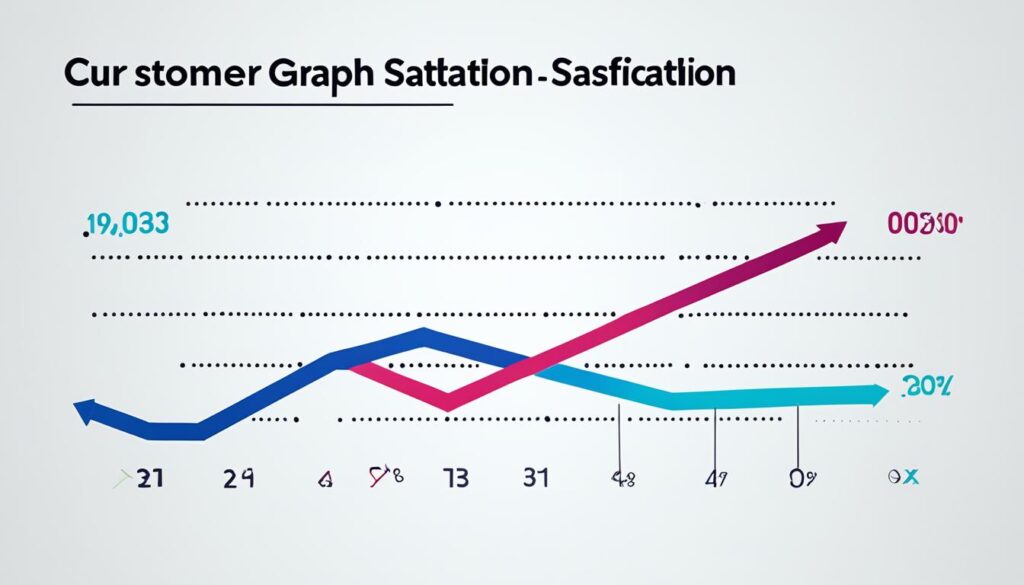Welcome to the world of customer satisfaction measurement! In today’s competitive market, measuring customer satisfaction is crucial for the success of your brand. Research shows that customer satisfaction is at its lowest point in the past two decades, despite the use of customer experience (CX) tools. Don’t let your customers slip away – it’s time to take action and improve their experience.
Attracting and retaining happy customers is the key to growth and revenue. To ensure your customers are satisfied, you need to understand their needs, preferences, and pain points. This is where customer satisfaction surveys come into play. By gathering feedback directly from your customers, you can uncover valuable insights and make data-driven decisions to enhance their experience.
In this article, we will explore the importance of customer satisfaction, strategies for improving it, and how it impacts your sales and marketing efforts. Additionally, we will delve into the benefits of conducting customer satisfaction surveys and the pivotal role of customer success teams. Let’s dive in and discover how you can boost your brand by measuring customer satisfaction!
The Importance of Customer Satisfaction
Customer satisfaction is a crucial metric for businesses as it helps them understand how happy and satisfied customers are with their products, services, and functionalities. It is an indicator of company health and has an impact on customer acquisition cost, time to value, and customer retention numbers.
There are several ways to measure customer satisfaction, including:
- Customer Satisfaction Metrics: Using customer satisfaction metrics such as CSAT surveys, Net Promoter Score (NPS) surveys, and Customer Effort Score (CES) surveys to gather quantitative data on customer satisfaction levels.
- Customer Experience Evaluation: Conducting customer experience evaluations to assess the overall customer journey, identify pain points, and make improvements to enhance customer satisfaction.
- Customer Satisfaction Tracking: Implementing customer satisfaction tracking systems to monitor changes in customer satisfaction over time and identify trends that require attention.
- In-App Surveys: Deploying in-app surveys to gather feedback directly from customers while they are using a product or service, providing real-time insights into their satisfaction.
- Churn Surveys: Conducting churn surveys to understand why customers leave and identifying areas for improvement to reduce customer churn and increase satisfaction.
- Retention Metrics: Tracking retention metrics, such as customer loyalty and repeat purchase rates, to gauge long-term satisfaction and loyalty.
- Customer Sentiment Analysis: Analyzing customer sentiment through sentiment analysis tools to gain an understanding of customers’ emotional reactions and perceptions.
“Customer satisfaction is not just a measure of how happy customers are; it is a strategic business imperative that impacts all aspects of a company’s success.” – John Smith, Customer Success Expert
Strategies for Improving Customer Satisfaction
To improve customer satisfaction and build stronger relationships with your customers, it is important to implement effective strategies. By focusing on key areas of your business, you can enhance customer experiences and drive loyalty. Here are some strategies that can help:
- Educate and onboard: Providing customers with the right information and helping them understand your products or services is crucial. Investing in educational materials, tutorials, and onboarding processes can empower customers and improve their overall satisfaction.
- Listen and understand: Take the time to ask your customers questions and truly listen to their answers. By understanding their needs and preferences, you can tailor your offerings to better meet their expectations and increase satisfaction.
- Train your support team: Your support team is on the front lines of customer interactions. Proper training can equip them to handle customer issues quickly and politely, ensuring a positive experience. Invest in ongoing training and encourage a customer-centric mindset.
- Personalize the experience: Customers appreciate feeling valued and appreciated. Implement personalization strategies such as personalized recommendations, customized communications, and tailored offerings to create a sense of exclusivity and strengthen customer relationships.
- Provide omnichannel support: Meet your customers where they are by offering support across multiple channels. Whether it’s through email, chat, social media, or phone, ensure a seamless experience that allows customers to reach out and receive assistance in their preferred way.
- Offer proactive support: Anticipate and address customer issues before they become problems. Proactively reach out to customers, provide preemptive solutions, and show that you are dedicated to their satisfaction.
“Implementing these strategies can have a significant impact on your customer satisfaction ratings and ultimately, your bottom line. By prioritizing customer feedback analysis and implementing customer retention strategies, you will create a customer-centric culture that fosters loyalty and long-term success.”
Remember, improving customer satisfaction is an ongoing process. Continuously analyze customer feedback, review customer satisfaction ratings, and refine your strategies to ensure that your customers remain happy and loyal.

The Role of Customer Satisfaction in Sales and Marketing
Customer satisfaction scores play a crucial role in boosting sales and marketing efforts. These scores provide vital information about the experiences, products, shopping channels, and journeys that customers prefer. By gathering and acting upon customer satisfaction survey data, businesses can make informed decisions to create better marketing campaigns, improve personalization, increase conversion rates, enhance customer communication, and stay authentic to their brand promise.
Customer satisfaction is the key to success in service marketing. When customers are satisfied, they are more likely to become repeat buyers and even recommend a business to others. Positive customer experiences can significantly impact a company’s reputation and revenue. On the other hand, negative customer experiences can lead to lost opportunities and harm a brand’s image.
Customer success teams also play a vital role in ensuring customer satisfaction. They are responsible for supporting customers throughout their journey, addressing any concerns or issues promptly and effectively. A satisfied customer is more likely to become an advocate for the brand, sharing their positive experiences with others and contributing to the overall success of the business.

“Customer satisfaction is not just about meeting customers’ expectations; it’s about exceeding them.”
Customer satisfaction scores provide valuable insights that businesses can use to drive their sales and marketing strategies. These scores help organizations understand customer preferences, identify areas for improvement, and develop targeted marketing campaigns that resonate with their target audience.
By continuously monitoring customer satisfaction scores, businesses can adapt their strategies to meet evolving customer needs and expectations. This proactive approach allows companies to stay ahead of the competition and build long-term relationships with their customers.
Key Benefits of Customer Satisfaction Scores in Sales and Marketing:
- Improved Marketing Campaigns: Customer satisfaction data helps businesses create more targeted and effective marketing campaigns by understanding what resonates with their customers and delivering messages that address their pain points and preferences.
- Enhanced Personalization: By analyzing customer satisfaction scores, businesses can gain insights into individual customer preferences, enabling them to deliver personalized experiences that build strong customer relationships.
- Increased Conversion Rates: Satisfied customers are more likely to convert, leading to higher conversion rates and improved sales performance. Understanding customer satisfaction scores allows businesses to optimize their conversion strategies and drive growth.
- Enhanced Customer Communication: Customer satisfaction scores provide businesses with valuable feedback on their communication efforts. By listening to their customers and acting on their feedback, companies can refine their communication strategies and strengthen customer relationships.
- Authentic Brand Perception: Aligning marketing efforts with customer satisfaction scores allows businesses to maintain an authentic brand perception. By consistently meeting customer expectations and delivering exceptional experiences, businesses can strengthen their brand reputation and attract new customers.
Ultimately, customer satisfaction scores are an invaluable tool for businesses in sales and marketing. They provide essential insights that drive strategic decision-making, enhance customer experiences, and contribute to the overall success of a company.
The Benefits of Customer Satisfaction Surveys
Customer satisfaction surveys offer businesses valuable insights into customer preferences, pain points, and their overall journey. By asking the right questions at the right time, you can gather vital feedback and make informed decisions about your offerings. These surveys help identify the best-performing products or services, understand the factors influencing customers’ journey, and gather valuable customer sentiment data.
With customer satisfaction data at your disposal, you can tailor your products and services to meet customer needs more effectively. By understanding your customers’ pain points, you can make targeted improvements that enhance their experience. This not only leads to higher satisfaction levels but also increases the likelihood of customer loyalty and repeat business.
Customer satisfaction surveys also contribute to support-driven growth strategies. When you prioritize customer satisfaction and listen to your customers’ feedback, you can identify areas for improvement and implement changes that enhance their experience. This, in turn, boosts customer loyalty and advocacy, driving organic growth through positive word-of-mouth referrals.
Key Benefits:
- Gather critical insights into customer preferences and pain points
- Make informed decisions based on valuable feedback
- Identify best-performing products or services
- Understand the factors influencing customers’ journey
- Gather customer sentiment data
- Enhance customer experience and satisfaction
- Drive customer loyalty and repeat business
- Contribute to support-driven growth strategies
To illustrate the power of customer satisfaction surveys, consider a scenario where an online retailer conducts a survey to gather feedback on their website’s usability. Through the survey responses, they discover that customers find the checkout process cumbersome and confusing. Armed with this valuable data, the retailer revamps their checkout process, streamlining it and making it more user-friendly. As a result, customer satisfaction increases, driving repeat purchases and positive customer reviews.

To unlock these benefits for your business, it’s important to incorporate customer satisfaction surveys into your overall customer experience strategy. By regularly seeking feedback from your customers, you can continuously improve your offerings, demonstrate that their satisfaction is your priority, and ultimately foster long-term customer loyalty.
The Role of Customer Success Teams
Customer success professionals are the driving force behind ensuring customer satisfaction and building long-term relationships with clients. With their in-depth knowledge of the products and services offered, they play a vital role in supporting customers and ensuring their success.
One of the key ways customer success teams contribute to support-driven growth is by leveraging customer satisfaction scores. These scores provide valuable insights into customer preferences, allowing organizations to tailor their marketing campaigns and product strategies accordingly. By understanding what makes customers happy and satisfied, businesses can maintain a positive brand image and increase customer retention.
Furthermore, customer success professionals serve as a bridge between customers and other teams within the organization. They gather valuable customer intelligence and distribute it to the marketing and product departments, enabling them to make data-driven improvements. This collaborative approach ensures that the entire organization is aligned with the goal of delivering outstanding customer experiences.
FAQ
How can businesses measure customer satisfaction?
Businesses can measure customer satisfaction through various methods such as CSAT surveys, NPS surveys, CES surveys, in-app surveys, churn surveys, retention metrics, and customer sentiment analysis.
What strategies can businesses implement to improve customer satisfaction?
Businesses can improve customer satisfaction by focusing on education and onboarding, asking customers questions and listening to their answers, training the support team, implementing personalization, providing omnichannel support, and offering proactive support.
Why are customer satisfaction scores important for boosting sales and marketing efforts?
Customer satisfaction scores provide vital information about customer preferences, pain points, and journeys, helping businesses create better marketing campaigns, improve personalization, increase conversion rates, enhance customer communication, and stay authentic to their brand promise.
How do customer satisfaction surveys contribute to improving and growing a brand?
Customer satisfaction surveys help businesses gather insights into customer preferences and pain points, identify best-performing products or services, understand factors influencing the customer journey, and gather customer sentiment data to support growth strategies.
What is the role of customer success teams in ensuring customer satisfaction?
Customer success teams are responsible for supporting customers, driving revenue from existing customers, distributing customer intel for marketing and product strategies, and creating an environment where customers feel successful. They play a crucial role in ensuring customer satisfaction and building long-term relationships.
